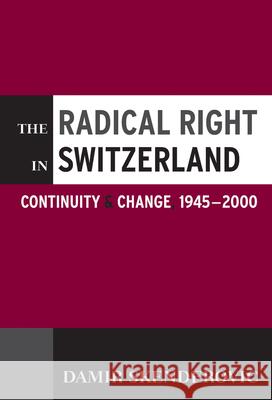The Radical Right in Switzerland: Continuity and Change, 1945-2000 » książka
The Radical Right in Switzerland: Continuity and Change, 1945-2000
ISBN-13: 9781845455804 / Angielski / Twarda / 2009 / 470 str.
There has been a tendency amongst scholars to view Switzerland as a unique case, and comparative scholarship on the radical right has therefore shown little interest in the country. Yet, as the author convincingly argues, there is little justification for maintaining the notion of Swiss exceptionalism, and excluding the Swiss radical right from cross-national research. His book presents the first comprehensive study of the development of the radical right in Switzerland since the end of the Second World War and therefore fills a significant gap in our knowledge. It examines the role that parties and political entrepreneurs of the populist right, intellectuals and publications of the New Right, as well as propagandists and militant groups of the extreme right assume in Swiss politics and society. The author shows that post-war Switzerland has had an electorally and discursively important radical right since the 1960s that has exhibited continuity and persistence in its organizations and activities. Recently, this has resulted in the consolidation of a diverse Swiss radical right that is now established at various levels within the political and public arena. Damir Skenderovic is Associate Professor of Contemporary History at the University of Fribourg. Previously, he was a Visiting Scholar at the Center for European Studies at New York University. His recent publications focus on the radical right, identity politics, migration, and 1968 in Western Europe, with a particular emphasis on Switzerland.
There has been a tendency amongst scholars to view Switzerland as a unique case, and comparative scholarship on the radical right has therefore shown little interest in the country. Yet, as the author convincingly argues, there is little justification for maintaining the notion of Swiss exceptionalism, and excluding the Swiss radical right from cross-national research. His book presents the first comprehensive study of the development of the radical right in Switzerland since the end of the Second World War and therefore fills a significant gap in our knowledge. It examines the role that parties and political entrepreneurs of the populist right, intellectuals and publications of the New Right, as well as propagandists and militant groups of the extreme right assume in Swiss politics and society. The author shows that post-war Switzerland has had an electorally and discursively important radical right since the 1960s that has exhibited continuity and persistence in its organizations and activities. Recently, this has resulted in the consolidation of a diverse Swiss radical right that is now established at various levels within the political and public arena.Damir Skenderovic is Associate Professor of Contemporary History at the University of Fribourg. Previously, he was a Visiting Scholar at the Center for European Studies at New York University. His recent publications focus on the radical right, identity politics, migration, and 1968 in Western Europe, with a particular emphasis on Switzerland.











